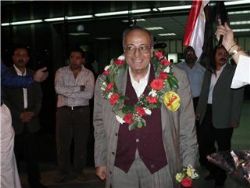
Thursday morning, July 3, 2008, Dr Abdelwahab El-Messiri passed away after a long bout with cancer. Dr El-Messiri was from the small Egyptian town of Damanhour in the Nile Delta, but when his brilliance was discovered by teachers in high school, they helped him to apply for a Fulbright fellowship to attend Columbia University, where he received a masters degree. He went on to complete a PhD in comparative literature at Rutgers University in New Jersey. He returned to Egypt to teach literature at Ain Shams University.
He is most famous in Egypt for writing the many-volumed “Encyclopedia of Jews, Judaism and Zionism.” Anyone who has traveled in the Arab world knows that for many Arabs, hatred for Zionism all too easily shades into a thoughtless anti-Semitism. But El-Messiri actively fought against this and his work clearly repudiated nonsense like the Protocols of the Elders of Zion. He never allowed anyone to utter a disparaging word about Jews or Judaism in his presence, reminding them of the clear difference between Judaism and Zionism.
El-Messiri’s attention turned to politics more recently when he signed on, in 2007, to be the coordinator of Kifaya, a grassroots pro-democracy movement in Egypt. But he maintained his active interest in literature, and he recently published an illustrated bilingual English-Arabic edition of his magnificent translation of Samuel Coleridge’s Rime of the Ancient Mariner.
Dr El-Messiri was an intellectual giant of the Arab world and I had the honor to meet him when I was in Egypt last April. My publisher and dear friend, Dr Ziad Mouna, director of the Syrian-Lebanese publishing house Cadmus Press, told Dr El-Messiri how much I wanted to meet him, and Dr El-Messiri was kind enough to invite me over to a salon at his house with some of his friends and intellectual collaborators, including writers, journalists, and architects. Dr El-Messiri had been suffering from bone marrow cancer for years and was frequently incapacitated by the treatment, but as he welcomed us into his house that night, he never complained or spoke of his illness. He never even winced.
That night there was a lively conversation about the fate of the political opposition movement in Egypt. Dr El-Messiri was convinced that it was only through an alliance with the Muslim Brotherhood that Kifaya could have any success. Nearly all of the people in the room were secular leftists, and they fiercely argued with him about this. Even the one guest who wore a headscarf shook her head firmly and said, “The Muslim Brotherhood is not the solution.” But El-Messiri countered this by pointing to the historical failure of the communist movement in the Arab world. Only the Muslim Brotherhood, he said, had captured a mass following, and so it was necessary for Kifaya to cooperate with them to achieve any political transformation in Egypt.
Though it was still spring, the temperature the day before had reached 47 C, and the air was still and close. But while we were sitting at Dr El-Messiri’s museum-like house (every wall, floor, and ceiling is covered with art: drawings, paintings, carvings, sculpture, and intricate metalwork), it abruptly began to rain and cool breezes wafted in from the balcony. Dr El-Messiri was not strong enough to get up from his chair and enjoy the rare rainshower.
So instead, he started telling jokes. He was working on a new book analyzing Egyptian jokes, and he clearly enjoyed his subject matter. It was while he was telling jokes that my limitations in Arabic became apparent. While I’d been following the political discussions with ease, I found that I just couldn’t understand the punchline of most of the jokes. When Dr El-Messiri saw that I was lost, he graciously translated for me, even though I was the only native English-speaker there, and he switched to his impeccable English to tell a few more jokes.
I later asked Dr El-Messiri if he would write the foreword to the Arabic translation of my book, Pyramids and Nightclubs. He said that between his obligations as the coordinator of Kifaya, his illness, and his own writing, he didn’t know if he would have time, but that he would consider it. Just two weeks ago he agreed to write it (though I doubt he ever got around to it). I am sure that he agreed more out of his friendship for Ziad Mouna, the book’s publisher, than for what he thought of me, the author, but I was still greatly honored by his willingness to do so.
Here is Dr Mouna’s short obituary for Dr El-Messiri in the Lebanese daily al-Akhbar (in Arabic). A longer retrospective of Dr El-Messiri’s life and work is planned for next month’s edition of the Egyptian magazine Weghat Nazar. Also in Arabic is his own website. For more information on Dr El-Messiri in English, see this 2007 profile in Al-Ahram.
–L.L. Wynn